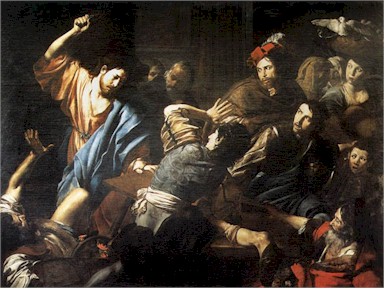Depending upon our situation at different times in our lives, we can find comfort and be encouraged by one or more of the many artistic interpretations that we have of Jesus. We always look for the image that speaks to our needs. But I wonder if there ever would be a time in our lives when we would search out an image of Jesus running through the temple with a whip of cords in his hand driving out the merchants and money changers? Not the most approachable image of Jesus, is it? Well, at least not at first glance.

John paints many versions of Jesus throughout his gospel. Mostly they show Jesus in control of the situation he is in - even when he is hanging on the cross. Today’s may be the most unsettling for a lot of us who prefer a picture of Jesus who is more compassionate, more predictable and easier to take. Here Jesus seems to be out of control as he swings a whip, drives out the money changers, sheep and oxen, spills the coins, overthrows the tables and tells those who sold the doves to get out. For those of us who like an orderly and predictable religious experience, this gospel reading makes us squirm.
Unlike the synoptic gospels, John places the temple cleansing at the beginning of his gospel. In this way, the story helps set the stage for what is to come in the narrative and helps interpret Jesus’ identity and mission. The long-awaited messiah has arrived and he is burning with zeal for God. Jesus’ fierce dedication is to the God reflected in our first reading from Exodus. This is not a God who wants to delight in the obedience of the people just because God likes subservience.
The commandments begin with three “words” that stress our relationship to God. Despite the multitude of gods worshiped by their neighbors, Israel has one God. This is the God who has chosen, protected and formed them into a people. These commands begin with a reminder of what God has already done for them. “I the Lord, am your God, who brought you out of the land of Egypt, that place of slavery.” The people of Israel will observe these commands to show their reverence for God and express their thanks for God’s gifts to them. Their observance will keep them in strong relationship to God and hold them together as a people. Keeping the commandments are the people’s response to God’s goodness towards us.” This is the God of Jesus, the One for whom his zeal burns.
Now is the time for us to encounter Jesus entering into our lives. Now is the time to allow Him to sweep out what is crass, unnecessary and formalistic in our lives and in our community. His Spirit wants to cleanse our very being, firing our spirits with a new enthusiasm for God and God’s ways. We cannot do this ourselves. Our zeal is not enough.





